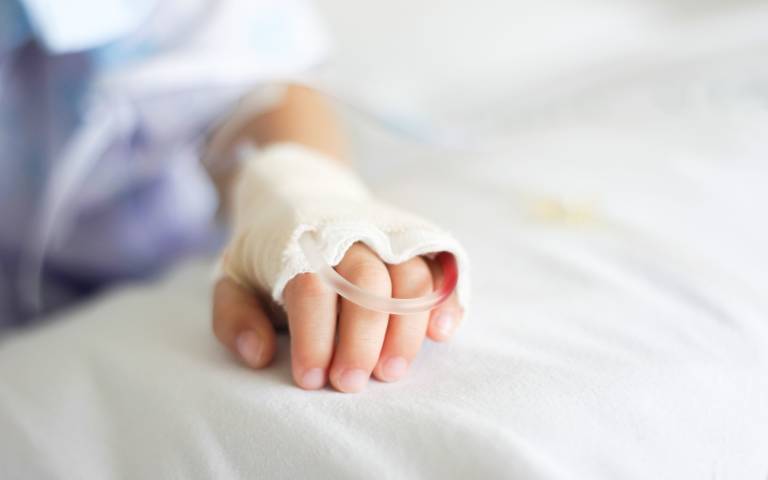Girl with deadly inherited condition is cured with UCL spinout gene therapy
16 February 2023
A girl born with a rare and fatal genetic condition has been potentially cured of her disease thanks to a revolutionary gene therapy developed by UCL spinout Orchard Therapeutics (Orchard).

Nineteen-month-old Teddi Shaw, from Northumberland, was diagnosed with metachromatic leukodystrophy (MLD), which causes severe damage to the nervous system and leads to children being unable to move, talk, swallow, eat and see.
There are no treatment options for children with MLD and children are offered only supportive care and invariably die young. But after becoming the first person to receive treatment on the NHS with pioneering drug Libmeldy, Teddi may now look forward to a disease-free life.
Orchard's development programmes focus on restoring normal gene function in severe devastating genetic disorders including neurometabolic diseases such as MLD.
The spinout was formed as a result of more than two decades of gene therapy research and clinical work by UCL Professors Bobby Gaspar and Adrian Thrasher (both UCL Great Ormond Street Institute of Child Health). Their ultimate aim was to bring potentially curative gene therapy medicines to patients with severe devastating diseases.
Libmeldy corrects the genetic cause of MLD by inserting functional copies of a faulty gene into the patient’s stem cells. The stem cells come from their own bone marrow or blood and are fed back into the body with the new genetic information.
NHS England reached an agreement with Orchard to offer Libmeldy to patients at an undisclosed discount.
Professor Bobby Gaspar, Honorary Professor at UCL Great Ormond Street Institute of Child Health and Chief Executive Officer of Orchard Therapeutics, said: “The availability of Libmeldy on the NHS for the treatment of metachromatic leukodystrophy (MLD) is extremely rewarding and we are incredibly proud to see this groundbreaking therapy now being routinely used as a standard approved medicine.”
Teddi had stem cells removed and the faulty genes replaced between June and October last year. She has an older sister, Nala, who was also diagnosed with MLD last year but is sadly too far advanced in her illness to benefit from the new treatment.
Their mother, Ally, said Teddi is doing ‘absolutely brilliant’ since undergoing treatment, adding: “She is walking, running, a chatterbox – absolutely no signs so far of MLD. She is an absolute character and has everyone around her laughing all the time.
“We are extremely privileged that Teddi is the first child to receive this on the NHS and grateful that she has the opportunity to lead a long and hopefully normal life. Without this treatment, we would be facing both our children being taken away.”
Orchard Therapeutics was founded in 2015 through a partnership between UCL Business (UCLB), the commercialisation company for UCL, and F-Prime Capital Partners, based on Professor Gaspar and Professor Thrasher’s research. F-Prime led on a £21 million Series A investment into Orchard.
In 2018, Orchard announced the closing of $225 million through its initial public offering to help transform the lives of patients with serious and life-threatening rare diseases.
The UCL Technology Fund, managed by AlbionVC in collaboration with UCLB, has also invested in Orchard.
Professor Geraint Rees, UCL Vice-Provost (Research, Innovation and Global Engagement) said: “Transforming the lives of children and their families living with this cruel disease through treatment on the NHS is an incredible achievement. Huge congratulations to all involved and UCL is incredibly proud to have played a part in this success.”
Links
- Orchard Therapeutics
- £438 million investment for UCL gene therapy spinouts
- UCL Great Ormond Street Institute of Child Health
- UCL Faculty of Population Health Sciences
- UCL Technology Fund
- UCL Business
- UCL Innovation & Enterprise
Image
Credit: AgFang / iStock
Media contact
Sophie Vinter
Tel: +44 (0)20 3108 7787
Email: s.vinter [at] ucl.ac.uk
 Close
Close

